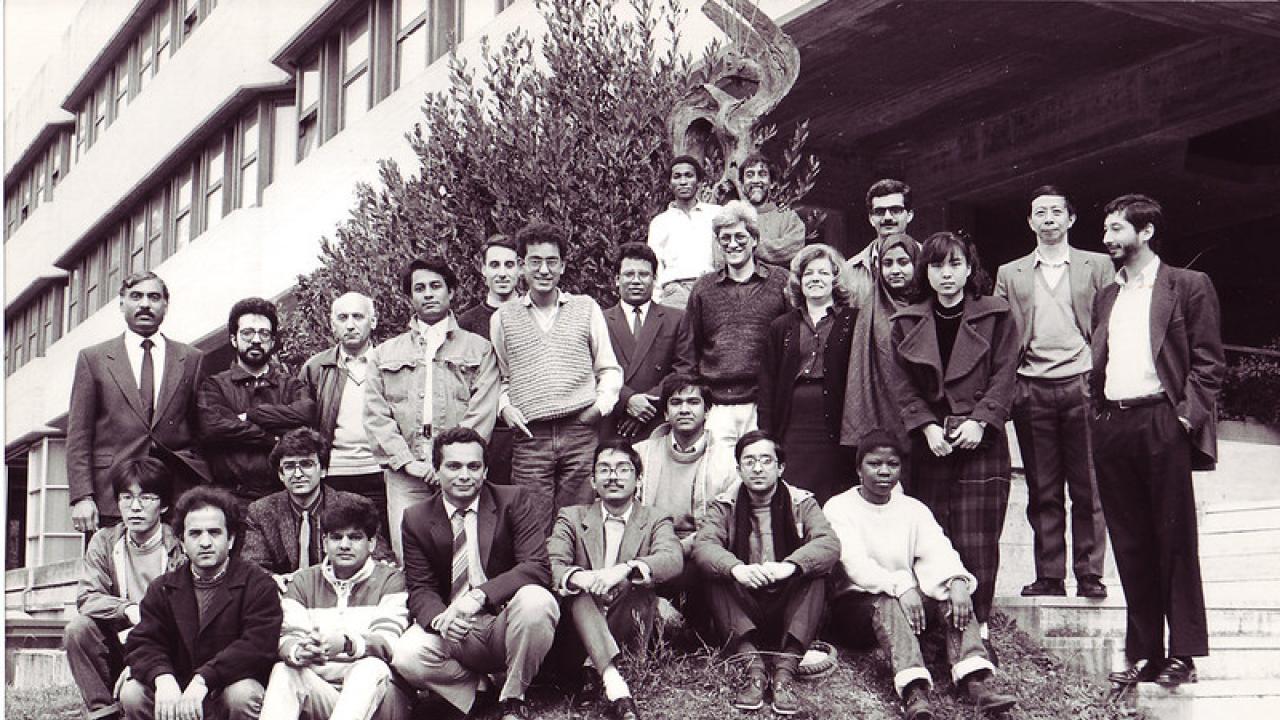
"ICTP has changed my life, both academically and personally. I would not be what I am or where I am today, if it had not been for ICTP." A big statement, but one Kamrul Hassan stands by. An alumni of the first class of ICTP Postgraduate Diploma Programme graduates, Hassan is now Professor of Physics at the University of Dhaka in his home country of Bangladesh, with fond memories of his time at ICTP.
Hassan and hundreds of his fellow Diploma alumni reunited virtually in August 2021 to celebrate the 30th anniversary of the Diploma Programme. For the occasion, ICTP checked in with several alumni from the first batch of graduates to see how their science careers have progressed since their life-changing experience at ICTP.
In 1990, Hassan was working in Dhaka, Bangladesh with a scientist who also happened to be an ICTP Associate. ICTP had recently announced the creation of a Diploma Programme for young scientists from developing countries who needed a boost in their studies to prepare them for doctoral degrees. "He gave me an application. I was not at all aware of what this new programme was about, but I applied," says Hassan. "The reply changed my life." ICTP's founder Abdus Salam wanted the Diploma Programme to do just that. The Diploma programme aimed to give talented students from developing countries the best possible preparation for advanced study in physics and mathematics, setting them up for successful careers in science as researchers, mentors, and teachers around the world.
For Hassan and his classmates who came to Trieste for the new programme in 1991, it was the first time in a foreign country. "That first day was so memorable," Hassan says. "Being the first batch of Diploma students, the luckiest thing was that we got to meet Abdus Salam. He wasn't physically well, but the Diploma Progamme was his dream, and he talked to us for over an hour, and we were spellbound, his words were so inspiring."
"So far there have been 216 Physicists who won Nobel prizes, but how many of them could build an institute like ICTP? How many of them change the life of so many?" Hassan says, reflecting on ICTP founder Salam's 1979 Nobel. "He always dreamt about how to build a bridge between scientists from developing countries and the developed world." The 23 students from 13 different countries in the first class of the Diploma Programme, and the more than 1000 graduates in the 30 years since, have gone a long way towards realizing that dream.
"When I got to ICTP I realised I had been in a pond before," Hassan remembers. "It was my first time in an international environment." After the Diploma Progamme, Hassan went on to do a PhD in the United Kingdom and a postdoctoral Humboldt fellowship in Germany before starting at the University of Dhaka, where he is now a senior professor. But his professional life was not the only thing changed by his experience in Trieste.
"I met my wife in Trieste," Hassan remembers. "It was already cold when we arrived to Trieste and moved to the city centre. In May, we opened our balcony for the first time, and just opposite there was another balcony, where we saw three girls there, and one of them was my future wife." She spoke English, and despite not knowing where Bangladesh was before meeting Hassan, "she was brave enough for love to come alone to an unknown place," Hassan says. Now, the pair live in Dhaka and have two daughters.
Along with that sweet outcome, "the second best thing that happened in Trieste was Concetta Mosca," Hassan says. The coordinator of the Diploma Programme treated all 23 of the Diploma students like her children, Hassan remembers. "Any problem we had, she was there to help us.
Now a full professor with many students of his own, Hassan encourages them to apply to the Diploma Progamme to get the best training possible. Hassan is now planning to write a book based on his research, which focusses on non-equilibrium statistical methods. "Most of my work is on percolation theory, fractal nd multifractal, network theory, kinetics of fragmentation and aggregation processes. My main research areas are problems which are far from equilibrium. I'm utterly in love with my research," Hassan says.
Hassan was an ICTP Junior Associate when building his career at the University of Dhaka, but has not been involved with ICTP until the 30th Anniversary Celebrations of the Diploma Programme in August 2021. "The alumni love the center so much, we want to visit it, visit Trieste, and stay involved," Hassan says. "This institute has really helped so many scientists."
----- Kelsey Calhoun
















